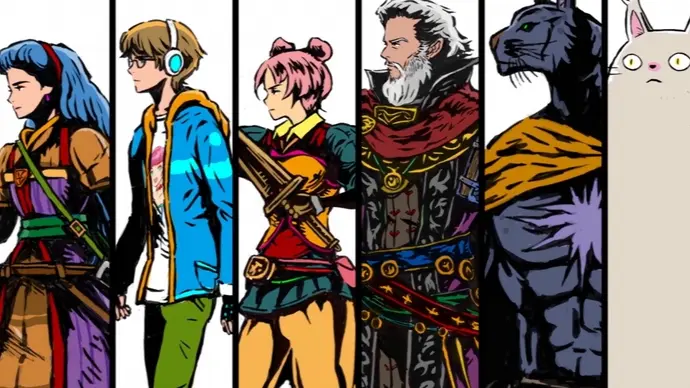In the world of JRPGs, Yuji Horii, Hironobu Sakaguchi, Nobuo Uematsu, and, depending on your generation, Hiroyuki Ito are like royalty. Although Ito may not be a household name, his resume should reassure you of his qualifications. Not only is he the creator of the Active Time Battle mode, which has been a staple of the Final Fantasy series, but he is also the director of Final Fantasy 6, Final Fantasy 9, and Final Fantasy 12. I think we can all agree that those three deserve a spot among the finest Final Fantasy games we’ve seen so far, regardless of our opinions on which one is the best (it’s Final Fantasy 12, by the way).
And Ito’s whereabouts have been something of a mystery for the last fifteen years, sometimes ridiculed by the Final Fantasy fandom, with his name only occasionally showing up in the credits of a few mobile projects or as a special thanks in larger games. Given how Final Fantasy 16 draws inspiration from the more traditional period of the series Ito is associated with, there was some conjecture that he may make an appearance on the squad. However, when the announcement of the game eventually happened, there was no reference to one of the series’ titans.
But then, as if by accident, an odd event occurred. Square Enix released a teaser for Dungeon Encounters, a minimalist JRPG that appears to have been made for not much more than the £20 that it is currently asking for on the eShop and any other digital stores you might frequent. The name of the game is so unremarkable that I had to go and double check it after writing this article. If not for one particular Hiroyoku Ito, the project’s director, it may have been completely ordinary.
If you’re familiar with his earlier work, you won’t be surprised to learn that the game is pretty amazing in and of itself. It’s a dungeon crawler that feels like it was written by hand, and it’s an RPG that has been aggressively pared down to the barest minimum. It reminds me a lot of Yasumi Matsuno’s own quirky ode to pen and paper role-playing games, Crimson Shroud (2012), which was similarly stripped down and the opposite of the exaggerated, grandiose adventures connected to the series that catapulted both developers to fame.
In addition, even though they are both simple games, they have an extravagant sense to them that is unmatched in the category. The idea behind this game is deceptively straightforward: you have to map out all 99 levels of a dungeon, each of which is filled with encounters with enemies and represented by rough, blank squares that are etched on paper then inked up as you go. others floors have really powerful enemies patrolling them, while others are just full of cannon fodder that you can use to grind your party down the levels and make them more resilient to whatever awaits them the next time they take the stairs down and go further and further below.
There are some crinkles in this game, but they are all very mild. You select your party at the beginning from a list of pre-rolled candidates, and other players are available for recruitment as you explore the dungeon’s floors. If you want to track down any of the other players, their coordinates are conveniently displayed in the menu. The fight system itself is likewise a piece of simple beauty: before you can chip away at an enemy’s health points, you must balance strikes to work past physical and magical defense. Ito’s ATB counters return to space each turn-based encounter out.
The fine penwork of Ryoma Ito, another Final Fantasy veteran who previously worked on the art design of Final Fantasy 12 and other related Ivalice outings like Revenant Wings and Final Fantasy Tactics Advance, is undoubtedly responsible for the static character art that conveys all of this even for its economy. It’s one of many references to that cherished period for the franchise; the other comes from producer Hiroaki Kato of Final Fantasy 12, who was instrumental in creating the game’s ingenious gambit system.
Although it’s not quite a companion piece to Final Fantasy 12, Dungeon Encounters offers an intriguing alternative to the game. Dungeon Encounters strips all of that back until you’ve got what amounts to a playable spreadsheet – a description that might have some running a mile, but one that has someone like myself running headlong and deliriously happy into its arms. That particular game could famously play itself, exposing the mechanisms behind so many RPGs and allowing you to tinker and toil with them until you’ve conjured and refined a beautiful machine of your own.
This is an interesting interpretation of the role-playing game, which may need some getting used to because of its minimalist design. But its simplicity has kept me interested and captivated for more than twelve hours, and I’m sure it will for many more. Though somewhat unexpected as the return of a genre titan, few other RPGs are as fast to the action or to the basic pull of numbers you’re urged to steer ever higher. This is in keeping with Ito’s great heritage. And that’s definitely all there is to know about this amazing little game, assuming you are aware of his importance.
